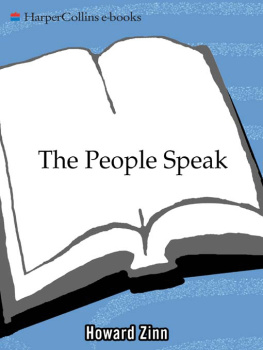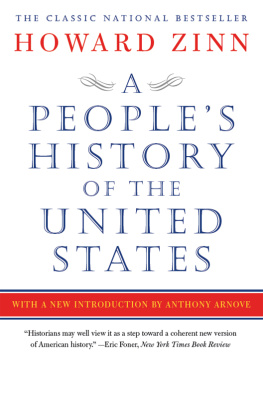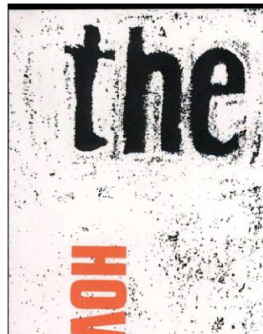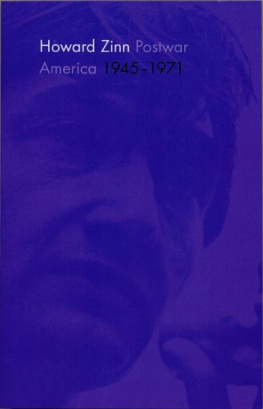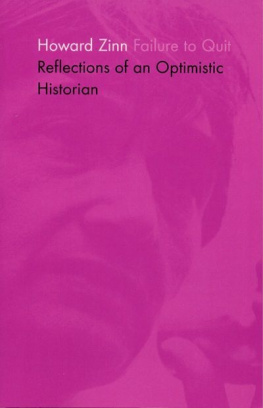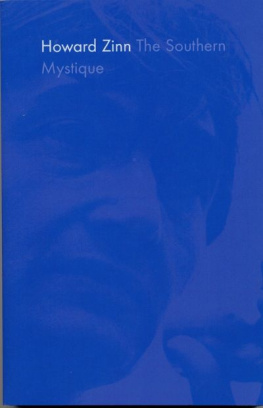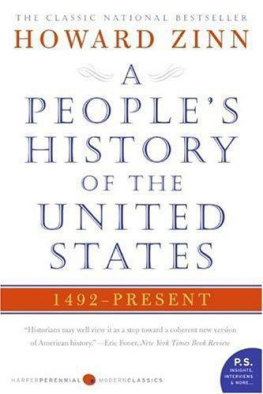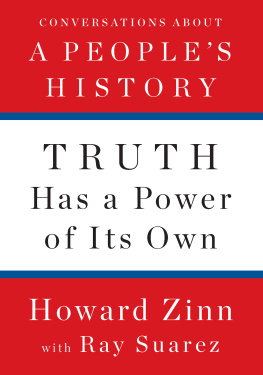The People Speak
American Voices,Some Famous,
Some Little Known
Dramatic Readings Celebrating
the Enduring Spirit of Dissent
Edited by Howard Zinn

To those Americans, past and present,
who knew what America could be
Contents
1. Introductory Excerpt from
A Peoples History of the United States
27. PostSeptember 11:
Families for Peaceful Tomorrows
In February of 2003 a remarkable event took place in New York City, a celebration of the millionth copy sold of Howard Zinns Peoples History of the United States. In his opening remarks that evening, HarperCollins editor Hugh Van Dusen noted that in addition to having sold a million copies, Zinns book has sold more copies every year than the year before through its twenty-three years.
For that evening, Zinn drew from his book, and from a few other sources, the statements of Americanssome famous, some little knownacross the range of American history. These were read by a distinguished cast of actors and writers assembled for just that event: James Earl Jones, Alice Walker, Kurt Vonnegut, Alfre Woodard, Marisa Tomei, Danny Glover, Myla Pitt, Andre Gregory, Harris Yulin, Jeff Zinn.
They read the words of Christopher Columbus, a Lowell mill girl, Frederick Douglass, John Brown, Mark Twain, Helen Keller, Eugene Debs, a House Un-American Activities interrogation, Malcolm X, a Gulf War resister, a family member of a victim of the September 11 Twin Towers attack, and others.
The enthusiastic response to that evening at the 92nd Street Y led to the idea that theater companies, as well as high schools and colleges, might want to do their own readings of this highly charged material. HarperCollins agreed to undertake the publication.
NARRATOR
My viewpoint, in telling the history of the United States, is that we must not accept the memory of states as our own. Nations are not communities and never have been. The history of any country, presented as the history of a family, conceals fierce conflicts of interest. And in such a world of conflict, a world of victims and executioners, it is the job of thinking people, as Albert Camus suggested, not to be on the side of the executioners.
Thus, in that inevitable taking of sides which comes from selection and emphasis in history, I prefer to try to tell the story of the discovery of America from the viewpoint of the Arawaks, of the Constitution from the standpoint of the slaves, of the rise of industrialism as seen by the young women in the Lowell textile mills, the conquest of the Philippines as seen by black soldiers on Luzon, the postwar American empire as seen by peons in Latin America. And so on, to the limited extent that any one person, however he or she strains, can see history from the standpoint of others.
My point is not to grieve for the victims and denounce the executioners. Those tears, that anger, cast into the past, deplete our moral energy for the present. And the lines are not always clear. In the long run, the oppressor is also a victim. In the short run, the victims, themselves desperate and tainted with the culture that oppresses them, turn on other victims.
Still, understanding the complexities, I will be skeptical of governments and their attempts, through politics and culture, to ensnare ordinary people in a giant web of nationhood pretending to a common interest. I will try not to overlook the cruelties that victims inflict on one another as they are jammed together in the boxcars of the system. I dont want to romanticize them. But I do remember (in rough paraphrase) a statement I once read: The cry of the poor is not always just, but if you dont listen to it, you will never know what justice is.
NARRATOR
Arawak men and women, naked, tawny, and full of wonder, emerged from their villages onto the islands beaches and swam out to get a closer look at the strange big boat. When Columbus and his sailors came ashore, carrying swords, speaking oddly, the Arawaks ran to greet them, brought them food, water, gifts.
He later wrote of this in his log.
COLUMBUS
Theybrought us parrots and balls of cotton and spears and many other things, which they exchanged for the glass beads and hawks bells. They willingly traded everything they owned. They were well-built, with good bodies and handsome features. They do not bear arms, and do not know them, for I showed them a sword, they took it by the edge and cut themselves out of ignorance. They have no iron. Their spears are made of cane. They would make fine servants. With fifty men we could subjugate them all and make them do whatever we want.
NARRATOR
We have no Indian voices to speak for the men and women of Hispaniola, but we have the volumes written by the Spanish priest Bartolom de las Casas, who was an eyewitness to what happened after Columbus came.
LAS CASAS
These people are by nature the most humble, patient, and peaceable, holding no grudges, free from embroilments, neither excitable nor quarrelsome. These people are the most devoid of rancors, hatred or desire for vengeance of any people in the world.
Yet into this sheepfoldthere came some Spaniards, who immediately behaved like ravening wild beasts, wolves, tigers, or lions that had been starved for many days. And Spaniards have behaved in no other way during the past forty years, down to the present time, for they are still acting like ravening beasts, killing, terrorizing, afflicting, torturing, and destroying the native peoples, doing all of this with the strangest and most varied new methods of cruelty, never seen or heard of before, and to such a degree that this Island of Hispaniola, once so populous (having a population that I estimated to be more than three millions) has now a population of barely two hundred persons.
NARRATOR
The American Revolution was not, as the orthodox histories would have it, the revolt of a unified people against England. The colonies were torn by class conflictfood riots and flour riots, and farmers rebellionsin the hundred years before the Revolution. During the Revolutionary War, conflict emerged again, when ordinary soldiers, angered by their humiliating treatment and the special privileges of the officers, mutinied against George Washington. He ordered that some of them be executed by their fellow mutineers. After the war, veterans who had been given small amounts of land found themselves so heavily taxed they could not meet their payments. In western Massachusetts, thousands of farmers surrounded the courthouses where their farms were being auctioned off and refused to allow the courts to proceed. Eventually Shays Rebellion, as it was called, was crushed, but it put a scare into the Founding Fathers, and when they met in 1787, shortly after, to create a Constitution, they made sure to set up a government strong enough to put down rebellion. These are the words of one of the participants in Shays Rebellion, a man named Plough Jogger.
PLOUGH JOGGER
Ive labored hard all my days and fared hard. I have been greatly abused, have been obliged to do more than my part in the war; been loaded with class rates, town rates, province rates, Continental rates, and all ratesbeen pulled and hauled by sheriffs, constables and collectors, and had my cattle sold for less than they were worth.
I have been obliged to pay and nobody will pay me. I have lost a great deal by this man and that man and tother man, and the great men are going to get all we have, and I think it is time for us to rise and put a stop to it, and have no more courts, nor sheriffs, nor collectors, nor lawyers, and I know that we are the biggest party, let them say what they will. Weve come to relieve the distresses of the people. There will be no court until they have redress of their grievances.

